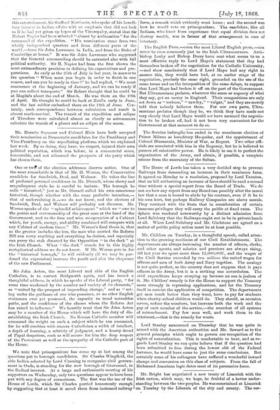One or twe of the election addresses deserve notice. One
of the most remarkable is that of Mr. H. Worms, the Conservative candidate for Sandwich, Deal, and Walmer. He takes the line of profound personal confidence in Mr. Disraeli, whose showy and magniloquent style he is careful to imitate. The borough he calls "historical," just as Mr. Disraeli called his own conscience historical, though whether with the same probable intention,— that of undervaluing it,—we do not know, and the electors of Sandwich, Deal, and Waltner will probably not discover. Mr. Worms speaks of the "splendid achievement" which we "owe to the genius and statesmanship of the great man at the head of the Government, and to the firm and wise co-operation of a Cabinet which, for youth, energy, and ability combined will compare with any Cabinet of modern times." Mr. Worms's final thesis is, that as the greater includes the less, the man who carried the Reform Bill can carry anything and everything he desires, and especially can parry the stab directed by time Opposition "in the dark" at the Irish Church. What "the (lark" stands for in this highly metaphorical address we do not know. If Mr. Worms gets in for the "historical borough," he will evidently (if we may be par- doned the expression) increase the youth and also the eloquence of the new Parliament.






























 Previous page
Previous page